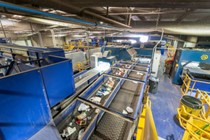
The Need: Polypropylene has historically been difficult to recover, but it’s one of the biggest revenue opportunities for materials recovery facilities (MRFs) today.
The Solution: How2Recycle recently upgraded polypropylene to “widely recycled” in the U.S.—a milestone that reflects the tremendous impact of $6.7 million in grants awarded by The Recycling Partnership’s Polypropylene Recycling Coalition to improve polypropylene recovery and further develop end markets.
Cedar Avenue Recycling and Transfer Station (CARTS), a Caglia Environmental company, recently took advantage of this grant funding through The Recycling Partnership to capitalize on the opportunity in polypropylene. CARTS chose AMP Robotics as a technology provider after several facility visits and working with the team. The collaboration between Caglia, AMP, and The Recycling Partnership is a great example of the role of public/private partnerships in modernizing recycling infrastructure to increase recovery and landfill diversion – and support a more circular economy for plastic packaging.
Which of the Pact’s 4 Targets does your work help achieve? Primarily Target 3: Undertake ambitious actions to effectively recycle or compost 50% of plastic packaging by 2025, but also Target 2: 100% of plastic packaging will be reusable, recyclable, or compostable by 2025.
What makes it particularly smart or circular? The market and pricing for recycled polypropylene is growing fast, driven by consumer demand, producer commitments, and government policy. Yet most MRFs aren’t capitalizing on this opportunity or preparing for a future where more accurate material identification and sortation can drive revenue instead of tipping fees.
Results, Benefits, and Outcomes to Date: The Recycling Partnership provided funding for one robotic arm, but CARTS decided to purchase two additional robots from AMP after seeing how AI and robotics technology could improve recovery of additional plastics and other recyclables. Along with the grant-funded PP-focused single arm, the MRF also has a tandem robot on its last-chance line picking high-density polyethylene (HDPE) natural, HDPE color, PET, and film. The facility installed another robot on the aluminum can line for quality control.
Even though CARTS has reduced its labor force somewhat thanks to the deployment of this technology, the robots were never meant to replace human labor, but rather to fill gaps and hard-to-hire-for positions. Placing a robot on the last-chance line eliminated the staffing issue in that part of the MRF. And following the robots’ installation, CARTS was able to reallocate manual sorters from quality control to other areas of the operation.
Robots can be superior to humans in quality controlling polypropylene given how many form factors the material comes in. It’s a challenging task for a human, and can be a full-time job, which is problematic in a tight labor market. AMP’s neural network recognizes 50 billion objects on an annual basis—a number that continues to exponentially increase as its install base expands. AMP’s vision technology counts more than 4.5 million discrete polypropylene materials daily. Plus, the AI platform is constantly learning and improving its ability to recognize and sort different objects made of polypropylene, along with a wide variety of other recyclables.
With CARTS’ focus on polypropylene recovery, having a robot dedicated to capture the material is crucial. The MRF is now producing cleaner, more valuable polypropylene bales, instead of a mixed bale of #3-#7 plastics.
How are you communicating your success? We’ve been highlighting CARTS’ modernization efforts and its utilization of grant funding in local and industry trade media. There are grants available to MRFs of all sizes, and in addition to media campaigns, we’re highlighting the outcomes they can help achieve on social media, in a written and video case study, and more. Caglia held an open house in September, which was attended by key state and local representatives and other community partners, to showcase its technology upgrades and commitment to innovation, resource recovery, and regulatory compliance in California.
What’s Next? We’ll continue to promote Caglia’s success with AI and robotics technology using the channels I mentioned above. We also continue to promote The Recycling Partnership’s grant application deadlines, and educate customers and prospects via webinar and other outreach about how to navigate the application process.
Quote: “The technology is only going to get better, and it’s pretty great as it is right now. I know there are partnerships and hybrids of different types of technologies coming out, and I’m looking forward to seeing what the industry brings and what else we can implement within our facility that can help us increase diversion and decrease landfilling,” Mike Ledieff, division manager for CARTS.
Company/Organization Information: AMP Robotics was founded in 2014. Headquartered in Louisville, Colorado, we have approximately 300 employees.